Israelis.

This is coolbert:
It is undeniable that the military plays a very strong role in Israeli society.
Has been ever since the creation of Israel, and continues to be.
Is seen as a rite of passage for Israelis who wish to become successful in their society.
For senior military officers, those of General rank, this seems to be even more so.
In contrast to the American military, retired General officers in Israel do aspire to and do achieve political careers after retirement from active military service.
Distinguished military service at the highest level just seems to prepare Israeli military men for further careers in politics, where achievement seems to be high also.
Political careers that include:
* Election to the Israeli Knesset [parliament].
* Appointment to a variety of cabinet positions.
* Leaders that create their own political party.
* Becoming Prime Minister or President of Israel [a ceremonial position].
Among the various senior Israeli Generals that have risen to high political office after retirement can be found: [but not limited to]
* Five Chief of Staffs. [Barak, Dayan, Eitan, Mofaz, Rabin.]
* Five founders of their own political party. [Dayan, Eitan, Sharon [2], Weizman, Zee'vi.]
* Two Presidents of Israel. [a ceremonial position.]
* Three Prime Ministers. [Barak, Rabin, Sharon.]
Ehud Barak.
"Barak joined the Israel Defense Forces in 1959 and served for 35 years, rising to the position of Chief of the General Staff and the rank of Rav Aluf, the highest in the Israeli military . . . Considered the most decorated soldier in Israel Defense Forces history . . .
In politics, he served as Minister of the Interior (1995) and Minister of Foreign Affairs (1995-1996). He was elected to the Knesset in 1996, where he served as a member of the Knesset Foreign Affairs and Defense Committee. In 1996 Barak became the leader of the Labor Party."
"Ehud Barak was elected Prime Minister of Israel on May 17th, 1999."
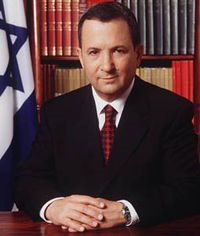
Moshe Dayan.
"Moshe Dayan was an Israeli military warrior who became a crusader for peace. He was skilled in both battle and diplomacy . . . in 1953, he was elected Chief of Staff of the armed forces . . . He joined Israel's Labor Party, Mapai, and was elected to the Knesset in 1959. He served as Minister of Agriculture in the government of David Ben-Gurion from 1959 until 1964 . . . he was appointed Minister of Defense under Levi Eshkol just in time for the Six-Day War in 1967 . . . in 1977, newly elected Likud Prime Minister Menachem Begin gave him a second chance by offering him the post of Minister of Foreign Affairs."
[also founder of the Telem political party.]
[there was never a time when I heard Moshe Dayan be interviewed on U.S. television where I was not impressed. This was a man of obvious leadership and charisma. A natural military man but NOT over-bearing in any sense of the word. Even that eye-patch contributed to a mystique and a certain "photogenic" personality?? Represented his nation in a manner that was only for the good!!]
"photogenic - - adj : looking attractive in photographs"

Rafael Eitan.
"Chief of Staff
On April 1, 1978, Eitan was promoted to the rank of General and was appointed by Ezer Weizman to be the Chief of Staff of the Israel Defense Forces . . . Eitan initially joined the "Tehiyah Party" and was first elected to the Knesset in 1984. Later he established an ultra-nationalist party called "Tzomet" which had conservative views on defense and foreign policy but a liberal domestic platform."

Chaim Herzog.
"he subsequently became head of the IDF Military Intelligence Branch, a position in which he served from 1948 to 1950 and again from 1959 to 1962. In the intervening years, he had served as defense attache at the Israeli Embassy in the United States (from 1950 to 1954). By the time he retired from the IDF in 1962, he held the rank of Major-General . . . In 1981 Herzog entered politics for the first time, winning election to the Knesset as a member of the Labour Party.
In 1983 he was elected the sixth President of Israel by the Knesset; he served two five-year terms (then the maximum permitted by Israeli basic law), retiring from political life in 1993."
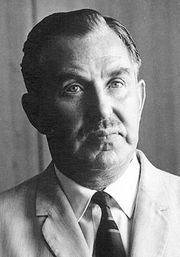
Shaul Mofaz.
"1998-2002 Became sixteenth Chief of General Staff . . . In November 2002, Shaul Mofaz was appointed Minister of Defense.
In May 2006 Shaul Mofaz was appointed Deputy Prime Minister and Minister of Transportation and Road Safety."
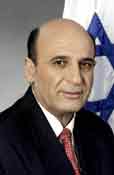
Yitzhak Rabin.
"In 1964 he rose to the position of Chief of Staff in the Israel Defense Forces (IDF) . . . In 1973, he was elected to the Knesset as a member of the Labor Party, and was appointed Minister of Labor . . . On June 2, 1974, he was elected Party leader and succeeded Golda Meir as Prime Minister of Israel . . . Until 1984 Rabin was a member of Knesset and a member of the Foreign Affairs and Defense Committee . . . During the years 1984 to 1990 Rabin was a Minister of Defense in several unity governments . . . From 1990 to 1992 he was an MP and member of the Foreign Affairs and Defense Committee again . . ."
"Second term as Prime Minister
1992 Rabin was elected as chairman of the Israeli Labor Party. In the elections that same year his party, strongly focusing on the popularity of its leader, won a clear victory"
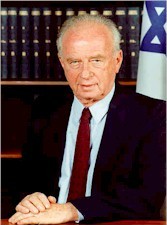
Ariel Sharon.
"However, after retiring from military service, Sharon was instrumental in establishing the Likud in July 1973 . . . In December 1973 Sharon was elected to the Knesset, but a year later he was tired of political life and resigned . . . Only then did he form his own list, Shlomtzion, which won only two Knesset seats in the subsequent elections. Immediately after the elections he merged Shlomtzion with the Likud and became Minister of Agriculture . . . After the 1981 elections, Begin rewarded Sharon for his important contribution to Likud's narrow win, by appointing him Minister of Defense . . . Sharon remained in successive governments as a Minister without portfolio (1983-1984), Minister for Trade and Industry (1984-1990), and Minister for Housing Construction (1990-1992) . . . In Benjamin Netanyahu's 1996-1999 government, he was Minister of National Infrastructure (1996-1998), and Foreign Minister (1998-1999). Upon the election of the Barak Labor government, Sharon became leader of the Likud party. After the collapse of Barak's government, Ariel Sharon was elected Prime Minister in February 2001."
[also the founder of Kadima political party!!]
[the accomplishments during the military career of Ariel are also major and comprise a long list!!]

Ezer Weizman.
"After the establishment of the State of Israel, Weizman joined the Israel Defence Forces and served as the Chief of Operations on the General Staff . . . He served as the commander of the Israeli Air Force between 1958 to 1966, and later served as deputy of the General Chief of Staff . . . After his retirement from the military, he joined the Gahal party (Gush Herut Liberalim; this later became the Likud) and served as Minister of Transportation . . . in 1977 served as Defence Minister in Menachem Begin's government . . . In 1984 Weizman established a new party called Yachad, which won 3 seats in the 11th Assembly of the Knesset . . ."
"Presidential term
He started his term on May 13, 1993. Throughout his life, famous for an outspoken, informal manner, regardless of his rank or position, which rarely failed to endear him once met face to face, even to sworn adversaries. He was known to frequent local cafes and play backgammon with locals."

Rehavam Zee'vi.
"From 1964 to 1968 he carried out the duties of the Chief of the Department of Staff in the Israeli General staff . . . served for several more months as the Chief of the Department of Staff. He finally retired, with the rank of major-general in 1974 . . . In 1988, Zeevi established Moledet . . . in February 2001, Zeevi joined the governing coalition and was made the tourism minister on March 7, 2001."
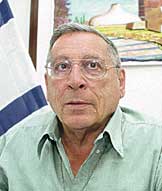
Some comments here:
We must not think that the prevalence of former general officers in high ppositions necessarily makes Israel a nation of warmongers or militarists. The Israeli have a strong military out of necessity. And officers by training and experience and possessing just strong personalities make natural leaders that will gravitate to politics and leadership positions. Military leaders are executives that are experienced at running institutions and making decisions. NOT vacillators. A valuable asset for any nation.
[also, this is a similar situation to which I have blogged and commented on before. But in the American context. Ten general officers that have become Presidents in the history of the U.S. hardly makes America any more of a war mongering nation than any other country. It would seem to be the contrary. NOT ONE war was fought during the terms of any President that had previously been a general officer!!]
coolbert.
Has been ever since the creation of Israel, and continues to be.
Is seen as a rite of passage for Israelis who wish to become successful in their society.
For senior military officers, those of General rank, this seems to be even more so.
In contrast to the American military, retired General officers in Israel do aspire to and do achieve political careers after retirement from active military service.
Distinguished military service at the highest level just seems to prepare Israeli military men for further careers in politics, where achievement seems to be high also.
Political careers that include:
* Election to the Israeli Knesset [parliament].
* Appointment to a variety of cabinet positions.
* Leaders that create their own political party.
* Becoming Prime Minister or President of Israel [a ceremonial position].
Among the various senior Israeli Generals that have risen to high political office after retirement can be found: [but not limited to]
* Five Chief of Staffs. [Barak, Dayan, Eitan, Mofaz, Rabin.]
* Five founders of their own political party. [Dayan, Eitan, Sharon [2], Weizman, Zee'vi.]
* Two Presidents of Israel. [a ceremonial position.]
* Three Prime Ministers. [Barak, Rabin, Sharon.]
Ehud Barak.
"Barak joined the Israel Defense Forces in 1959 and served for 35 years, rising to the position of Chief of the General Staff and the rank of Rav Aluf, the highest in the Israeli military . . . Considered the most decorated soldier in Israel Defense Forces history . . .
In politics, he served as Minister of the Interior (1995) and Minister of Foreign Affairs (1995-1996). He was elected to the Knesset in 1996, where he served as a member of the Knesset Foreign Affairs and Defense Committee. In 1996 Barak became the leader of the Labor Party."
"Ehud Barak was elected Prime Minister of Israel on May 17th, 1999."

Moshe Dayan.
"Moshe Dayan was an Israeli military warrior who became a crusader for peace. He was skilled in both battle and diplomacy . . . in 1953, he was elected Chief of Staff of the armed forces . . . He joined Israel's Labor Party, Mapai, and was elected to the Knesset in 1959. He served as Minister of Agriculture in the government of David Ben-Gurion from 1959 until 1964 . . . he was appointed Minister of Defense under Levi Eshkol just in time for the Six-Day War in 1967 . . . in 1977, newly elected Likud Prime Minister Menachem Begin gave him a second chance by offering him the post of Minister of Foreign Affairs."
[also founder of the Telem political party.]
[there was never a time when I heard Moshe Dayan be interviewed on U.S. television where I was not impressed. This was a man of obvious leadership and charisma. A natural military man but NOT over-bearing in any sense of the word. Even that eye-patch contributed to a mystique and a certain "photogenic" personality?? Represented his nation in a manner that was only for the good!!]
"photogenic - - adj : looking attractive in photographs"

Rafael Eitan.
"Chief of Staff
On April 1, 1978, Eitan was promoted to the rank of General and was appointed by Ezer Weizman to be the Chief of Staff of the Israel Defense Forces . . . Eitan initially joined the "Tehiyah Party" and was first elected to the Knesset in 1984. Later he established an ultra-nationalist party called "Tzomet" which had conservative views on defense and foreign policy but a liberal domestic platform."

Chaim Herzog.
"he subsequently became head of the IDF Military Intelligence Branch, a position in which he served from 1948 to 1950 and again from 1959 to 1962. In the intervening years, he had served as defense attache at the Israeli Embassy in the United States (from 1950 to 1954). By the time he retired from the IDF in 1962, he held the rank of Major-General . . . In 1981 Herzog entered politics for the first time, winning election to the Knesset as a member of the Labour Party.
In 1983 he was elected the sixth President of Israel by the Knesset; he served two five-year terms (then the maximum permitted by Israeli basic law), retiring from political life in 1993."

Shaul Mofaz.
"1998-2002 Became sixteenth Chief of General Staff . . . In November 2002, Shaul Mofaz was appointed Minister of Defense.
In May 2006 Shaul Mofaz was appointed Deputy Prime Minister and Minister of Transportation and Road Safety."

Yitzhak Rabin.
"In 1964 he rose to the position of Chief of Staff in the Israel Defense Forces (IDF) . . . In 1973, he was elected to the Knesset as a member of the Labor Party, and was appointed Minister of Labor . . . On June 2, 1974, he was elected Party leader and succeeded Golda Meir as Prime Minister of Israel . . . Until 1984 Rabin was a member of Knesset and a member of the Foreign Affairs and Defense Committee . . . During the years 1984 to 1990 Rabin was a Minister of Defense in several unity governments . . . From 1990 to 1992 he was an MP and member of the Foreign Affairs and Defense Committee again . . ."
"Second term as Prime Minister
1992 Rabin was elected as chairman of the Israeli Labor Party. In the elections that same year his party, strongly focusing on the popularity of its leader, won a clear victory"

Ariel Sharon.
"However, after retiring from military service, Sharon was instrumental in establishing the Likud in July 1973 . . . In December 1973 Sharon was elected to the Knesset, but a year later he was tired of political life and resigned . . . Only then did he form his own list, Shlomtzion, which won only two Knesset seats in the subsequent elections. Immediately after the elections he merged Shlomtzion with the Likud and became Minister of Agriculture . . . After the 1981 elections, Begin rewarded Sharon for his important contribution to Likud's narrow win, by appointing him Minister of Defense . . . Sharon remained in successive governments as a Minister without portfolio (1983-1984), Minister for Trade and Industry (1984-1990), and Minister for Housing Construction (1990-1992) . . . In Benjamin Netanyahu's 1996-1999 government, he was Minister of National Infrastructure (1996-1998), and Foreign Minister (1998-1999). Upon the election of the Barak Labor government, Sharon became leader of the Likud party. After the collapse of Barak's government, Ariel Sharon was elected Prime Minister in February 2001."
[also the founder of Kadima political party!!]
[the accomplishments during the military career of Ariel are also major and comprise a long list!!]

Ezer Weizman.
"After the establishment of the State of Israel, Weizman joined the Israel Defence Forces and served as the Chief of Operations on the General Staff . . . He served as the commander of the Israeli Air Force between 1958 to 1966, and later served as deputy of the General Chief of Staff . . . After his retirement from the military, he joined the Gahal party (Gush Herut Liberalim; this later became the Likud) and served as Minister of Transportation . . . in 1977 served as Defence Minister in Menachem Begin's government . . . In 1984 Weizman established a new party called Yachad, which won 3 seats in the 11th Assembly of the Knesset . . ."
"Presidential term
He started his term on May 13, 1993. Throughout his life, famous for an outspoken, informal manner, regardless of his rank or position, which rarely failed to endear him once met face to face, even to sworn adversaries. He was known to frequent local cafes and play backgammon with locals."

Rehavam Zee'vi.
"From 1964 to 1968 he carried out the duties of the Chief of the Department of Staff in the Israeli General staff . . . served for several more months as the Chief of the Department of Staff. He finally retired, with the rank of major-general in 1974 . . . In 1988, Zeevi established Moledet . . . in February 2001, Zeevi joined the governing coalition and was made the tourism minister on March 7, 2001."

Some comments here:
We must not think that the prevalence of former general officers in high ppositions necessarily makes Israel a nation of warmongers or militarists. The Israeli have a strong military out of necessity. And officers by training and experience and possessing just strong personalities make natural leaders that will gravitate to politics and leadership positions. Military leaders are executives that are experienced at running institutions and making decisions. NOT vacillators. A valuable asset for any nation.
[also, this is a similar situation to which I have blogged and commented on before. But in the American context. Ten general officers that have become Presidents in the history of the U.S. hardly makes America any more of a war mongering nation than any other country. It would seem to be the contrary. NOT ONE war was fought during the terms of any President that had previously been a general officer!!]
coolbert.
Labels: Israel

0 Comments:
Post a Comment
Subscribe to Post Comments [Atom]
<< Home